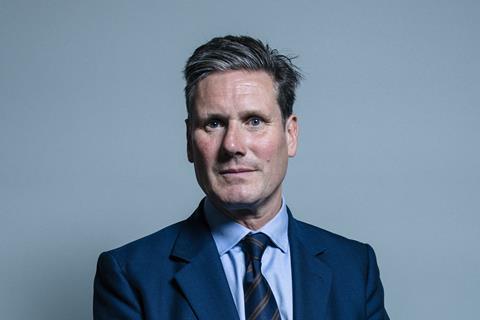
The UK has elected a Labour government, led by prime minister Keir Starmer, with a landslide majority.
Screen has spoken to representatives from across the film and TV industry about what they would like to see the new government do for the sector.
We will be updating this page across the coming days, so contact us with further suggestions here.
Simon Cornwell, CEO, co-founder, The Ink Factory
There has been – rightly – much feting of the [Conservative] government’s support for lower budget films and of the UK’s tax incentive structure generally for film and high-end television. But this masks a much more damaging trend for the industry which urgently needs to be put right. We make international films and television that showcase to the world the best of our creativity and our industry, but as a direct result of Brexit, we are forced to move significant amounts of expenditure away from the UK to make our shows financially viable.
On the second season of The Night Manager, currently in production, I’d estimate we have had to move between $20 and $30 million dollars of expenditure away from the UK, and from UK crew and talent, in order to access European incentives – something that a few years ago was wholly unnecessary.
This illustrates in the harshest possible way the direct economic harm being done to the UK industry – and the UK generally – by the lack of a close working relationship with Europe. My hope therefore is the new government will tackle this issue head on and take action to reintegrate with Europe on whatever pragmatic basis is available to us, to build a stronger, more prosperous future for our industry and for the UK as a whole.
Anna Higgs, managing director, Casarotto Ramsay & Associates
I’d like to see any new UK government think more holistically about the screen industries. In the early 2000s, I was lucky enough to work with Ken Robinson and Gordon Brown in the set up Creative Partnerships, a flagship £100m+ investment in creativity in education.
What I learnt there, and how that chimed with my own experience trying to break into the creative sectors, is that unless you invest for the long term – thinking about education in, access to, and funding of the arts – you can’t reap the full potentially huge rewards. We all know that Return on Investment on public money spent in our sectors returns at a multiplier directly, but also has innumerable indirect benefits to commerce, health, tourism, technology and beyond; so excuses citing magic money trees are short-sighted at best.

Tax credits come and go and, like surfers, inward investment moves wherever the breaks are biggest. So, thinking more strategically about the long-term benefits of the arts, culture and creativity from the earliest years will ensure that more than a privileged few can make our sectors more sustainable, vibrant, innovative and representative. This in turn improves the work and help us to deliver on our reputation as a world-leading creative nation. It’s a long game, but one we can win if we’re smart enough to play it.
Zygi Kamasa, founder, CEO, True Brit Entertainment
The [Conservative] government has made a significant impact in supporting British independent feature films with the new independent film tax credit.
The new government needs to not only continue to support that tax credit for the long-term benefit of British feature films but also needs to consider looking to expand it to be applicable against 100% of production spend of those feature films.Countries like Italy and Malta and even Australia all have a 40% net tax credit, so whilst 32% is significant we are still uncompetitive with those countries, and we need to ensure for the long-term that we can retain production in the UK.
A full 40% net of production spend for independent features would be a brilliant way for the new government to show that cultural British feature films matter in the same way as it did for the former government.
Phil Clapp, CEO, UK Cinema Association
We’d like the new government to recognise the unique contribution that ALL cinemas make to the cultural, social and economic life of communities across the UK, providing affordable big screen entertainment to people of all ages and backgrounds.
That means support for the sector as it continues its recovery, and understanding of the significantly increased costs that UK cinemas still face on utilities and staffing, and a fresh look (as is promised by a number of the major parties) at the currently iniquitous business rates regime, which disadvantages ‘bricks and mortar’ businesses such cinemas which bring life and vibrancy to the high street. And support for the sector as it seeks to makes its venues more sustainable and energy efficient.
We recognise that the public purse strings will be tight for whoever comes in post the election, but would nevertheless renew our call for consideration of a reduced level of VAT on cinema tickets and indeed tickets to other cultural venues, as is the norm across Europe, sending a strong signal as to the value of culture and helping remove any barriers of cost.
Andy Leyshon, CEO, Film Distributors’ Association
Our hope is that the new Labour government will fully embrace the film industry with a holistic approach across the entire sector, which also understands that there doesn’t have to be a disconnect between the cultural and the commercial. We have a vibrant sector that contributes so much to UK society and the economy, but also has so much more potential with the right encouragement over the coming years.
From a distribution perspective, we would like to see government have the ambition to introduce a new targeted expenditure credit for distribution and marketing costs that would work seamlessly alongside the Independent Film Tax Credit. At a time when finances will no doubt be tight, such an intervention could be easily achieved at a very low cost and subsequently deliver a high return on investment. All parts of the film ecosystem would feel the benefit – distributors would be encouraged to release more films with a wider regional release footprint and broader marketing campaigns; as a result exhibitors would experience improved admission levels with increased ticket and concession revenue; and completing the virtuous circle, producers would have more chance of recouping on their investments and generating strong interest in future projects.
Importantly, the value would also extend well beyond the industry to mirror the new government’s planned vision of change and sense of national renewal. With a new, easily implementable distribution intervention, the film industry could enable impressive cultural changes. Broader filmmaking voices from across all corners of the nation would be encouraged, and at the same time ever more diverse audience engagement would reflect modern Britain at its very best. We welcome the new Labour government and hope that collective support from DCMS, Treasury and all areas of the film industry will help drive our sector to new heights.
Leo Pearlman, managing partner, producer, Fulwell73
This new government should be bullish, they should show confidence in the TV and film industry. I see this as an opportunity to show the world just what we have to offer. The growth in this sector in the past decade has been exponential – that’s been down to a good working relationship between private and public funding. If this next decade is going to show the same growth, we can’t stand pat. We have to recognise territories are actively doing things to catch us. It’s shocking that Budapest is the second-largest production hub in Europe after London; that there isn’t a second major production hub in the UK is testament to the fact that we’ve taken our eye off the ball.
The new government needs to support the workforce that currently exists and enable them to adapt to the changes ahead. They need to make a concerted, strategic effort and investments to building up the next generation of skilled workers. And they absolutely have to focus on extending the footprint of the industry from the Southeast and London. Not to the detriment of the Southeast and London - that will always be the jewel in the crown for our industry - but they need to look at the UK as a national proposition. To consolidate what we have in the Southeast and London we should look outside - to build that second-, third- and fourth-biggest production hubs.
Natasha Dack Ojumu, founder, Tigerlily Productions
My hope is the new government will continue to support the UK tax credit and the Global Screen Fund. But there’s a more wider problem that the new government will need to address, which is to do with education, and encouraging young people to see that cultural sector careers are a viable option no matter what their background; it seems to me that during the Conservative’s tenure, creativity and cultural education was undervalued; university level humanities courses have been closing, and arts and music classes in state schools have been cut back. I hope a new government will recognise the huge contribution that the arts and culture industry make to the UK economy and support it by increasing their spend on education.
Jon Wardle, director, National Film and Television School
As the new UK government takes office, we hope to see a dedicated culture minister appointed for the long term. Stability in this role is crucial for crafting and implementing policies that support the growth of the film and TV industries. A consistent vision will help nurture the creative economy and address the unique challenges we face.
Additionally, we also urge the new government to loosen the rules on the apprenticeship levy. Although film and TV companies contribute £23 million annually to the levy, its impact on workforce development remains limited. Reforming these rules will better optimise the use of funds to build a skilled and diverse workforce.

Finally, supporting creative education in schools through a new and well-funded Cultural Education Plan will ensure that young people from all backgrounds can engage with the arts, thereby securing the future of our industry.
Jack Thomas-O’Brien, producer, Sixteen Films
We’ve got a patchy relationship with the Labour party here at Sixteen Films – Ken [Loach] was kicked out as part of the ‘purge’ of the left. I think it shows a weakness towards opposing views that we should all be concerned about.
But looking forward, we need to collectively push for all kinds of things. At the very least we hope Labour will stick to the terms of the new (AVEC) tax credit, which should give us producers a bit more power and fix what was lost in terms of international coproduction interest from Europe after Brexit. Let’s hope Keir doesn’t flip flop on this!
But what I’d really like to see is something much more proactive done about exhibition. Two Picturehouse cinemas closed last week [Fulham Road and Stratford East announced they are shutting later in July, with a third site in Bromley set to close in August] and cinemas are really struggling to make ends meet. I’m not saying our neighbours across the channel have got it all right but if we taxed the streamers properly and injected that directly into creating a more sustainable cinema culture we’d all benefit greatly in the long term. It’s too expensive going to the cinema, so people take less risks in what they go to watch. There are great films from around the world on every week but until we can pack out cinemas and get people talking about them they’ll keep fading away.
And give the BFI more money to do the work it needs in supporting new and exciting British talent!
Abraham Adeyemi, filmmaker
Some of our most promising writers, directors and artists are increasingly leaving the industry because they are incapable of surviving and meeting basic needs. Those who attempt to hang in there do it through severe struggle that is detrimental to the quality of the art they are capable of producing.
I would like to see the new UK government provide real, tangible support to that allows promising talents the space and conditions to thrive. This would be in the form of things like bursaries, discounted travel and discounted housing – anything that significantly reduces the monthly outgoings on their basic necessities.
Paul Fleming, general secretary, Equity
With the election completed, our new government must get to grips with the performing arts and entertainment, a critical sector for the UK’s long-term success.
We’ll be pressing the new administration to set out a long-term plan for UK arts funding to reach the European average, to tackle the high upfront fees charged by casting directories, to make Universal Credit fairer for freelancers, to ensure public subsidy only supports work on decent union terms, and to fight for better rights in the video games and TV commercials sector.
There are no creative industries without this incredible workforce. It’s time politicians stand up and offer them the same recognition that is offered by audiences across the world.
Ellie Peers, general secretary, Writers Guild of Great Britain
As the UK wakes up to a new government and chapter in our political history, we call for a better deal for UK writers, who have too often been underpaid, unprotected and overlooked, in an industry that is struggling to survive.
The new administration must protect, support and nurture UK writers by introducing protections on fair pay and fair treatment, ensure our creative industries are sustainable, and – in a world being revolutionised by AI – introduce robust protections on copyright. In short, it must put writers where they belong – at the heart of the story.
Andy Harrower, CEO, Directors UK
With the election of a new Labour Government, we reiterate our call to ministers to introduce the following measures which will make a real improvement to the working lives of the UK’s freelance film and TV directors.
We must work together to foster an ever-flourishing creative industries sector which generates economic growth and jobs across the country.
1. Introduce a Freelancer Commissioner in Whitehall to represent and defend the interests and concerns of the UK’s 4.3 million freelancers who often fall through the cracks of the UK’s tax, pension and benefits system.
2. Introduce a Smart Fund to pay creatives for the private copying and consumption of their content on digital devices such as laptops and mobiles, and fund grassroots arts schemes that will foster greater industry diversity.
3. Ensure the AI sector — through robust regulatory action — respects the UK’s ‘Gold Standard’ IP Copyright Regime and honours their obligations to that system through transparency, accountability and financial compensation.
Mark Herbert, founder & CEO, Warp Films
After 25 years producing TV and film across the UK, including two TV series for Netflix and BBC currently filming in Yorkshire, where our headquarters in Sheffield proudly contributes to the local economy, I hope the new Labour government can robustly support and unleash the full potential of the creative industries to foster sustainable long-term growth, particularly within the nations and regions.






![The Brightest SunScreen[Courtesy HKIFF]](https://d1nslcd7m2225b.cloudfront.net/Pictures/274x183/3/5/0/1448350_thebrightestsunscreencourtesyhkiff_312678.jpg)


















No comments yet